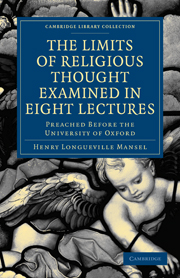 The Limits of Religious Thought Examined in Eight Lectures
The Limits of Religious Thought Examined in Eight Lectures Book contents
Summary
“YET YE SAY, THE WAY OF THE LORD IS NOT EQUAL. HEAR NOW, O HOUSE OF ISRAEL; IS NOT MY WAY EQUAL? ARE NOT YOUR WAYS UNEQUAL?”
“If I build again the things which I destroyed, I make myself a transgressor.” This text might be appropriately prefixed to an examination of that system of moral and religious criticism which, at the close of the last century, succeeded for a time in giving a philosophical connection to the hitherto loose and floating theological rationalism of its age and country (1). It was indeed a marvellous attempt to send forth from the same fountain sweet waters and bitter, to pull down and to build up by the same act and method. The result of the Critical Philosophy, as applied to the speculative side of human Reason, was to prove beyond all question the existence of certain necessary forms and laws of intuition and thought, which impart a corresponding character to all the objects of which Consciousness, intuitive or reflective, can take cognisance. Consciousness was thus exhibited as a Relation between the human mind and its object; and this conclusion, once established, is fatal to the very conception of a Philosophy of the Absolute. But by an inconsistency scarcely to be paralleled in the history of philosophy, the author of this comprehensive criticism attempted to deduce a partial conclusion from universal premises, and to exempt the speculations of moral and religious thought from the relative character with which, upon his own principles, all the products of human consciousness were necessarily invested.
- Type
- Chapter
- Information
- The Limits of Religious Thought Examined in Eight LecturesPreached before the University of Oxford, in the Year M.DCCC.LVIII on the Foundation of the Late Rev. John Bampton, pp. 141 - 161Publisher: Cambridge University PressPrint publication year: 2009First published in: 1867
